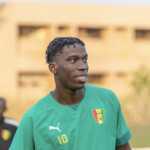The focus shifted to the clash involving Congolese captain Chancel Mbemba and Morocco’s coach Walid Regragui. The exchange between the two figures created a buzz, with Mbemba expressing concerns about Regragui’s conduct in the mixed zone.
Olympique de Marseille’s central defender, Mbemba, highlighted Regragui’s post-match behavior, especially the coach’s request for eye contact during the handshake.
Mbemba, though choosing to keep specific details to himself, emphasized his respect for the coach and hinted at possessing evidence of the incident.
In a composed statement, he stated, “I respect everyone, I don’t need to shoot anyone, but God’s justice is there.”
Breaking his silence on the matter after the DRC’s qualification for the quarter-finals against Egypt (1-1, 7-8 penalties), Mbemba took a more conciliatory tone.
While avoiding direct discussion about the Moroccan coach, he subtly attempted to ease tensions by expressing his affection for Morocco. Mbemba disclosed, “I spend my summers in Marrakech with my wife and children.
Everyone loves Morocco. If I go on vacation to Morocco with my children…”
The episode involving Regragui had initially led to a four-match suspension, but the coach was eventually exonerated on appeal, with the only sanction being a one-match suspension served in the stands against Zambia.
Despite this resolution, the Congolese Football Federation (Fecofa) announced its intention to refer the matter to the Court of Arbitration for Sport (CAS), challenging the decision of the CAF appeal jury.
The ongoing legal discourse adds an intriguing layer to the tournament’s narrative, emphasizing the impact of both on-field and off-field events in the footballing arena.
@mbemba22 :”je passe mes vacances à Marrakech avec ma famille.
Est-ce que vous aimez le Maroc?
Bien sûr”#CAN2023 #Maroc pic.twitter.com/dqbCRrVsMO— antar abdelwarit (@AAbdelwarit) January 29, 2024










